What's Your Favorite Sitcom From NBC's Defunct Thursday Comedy Block?
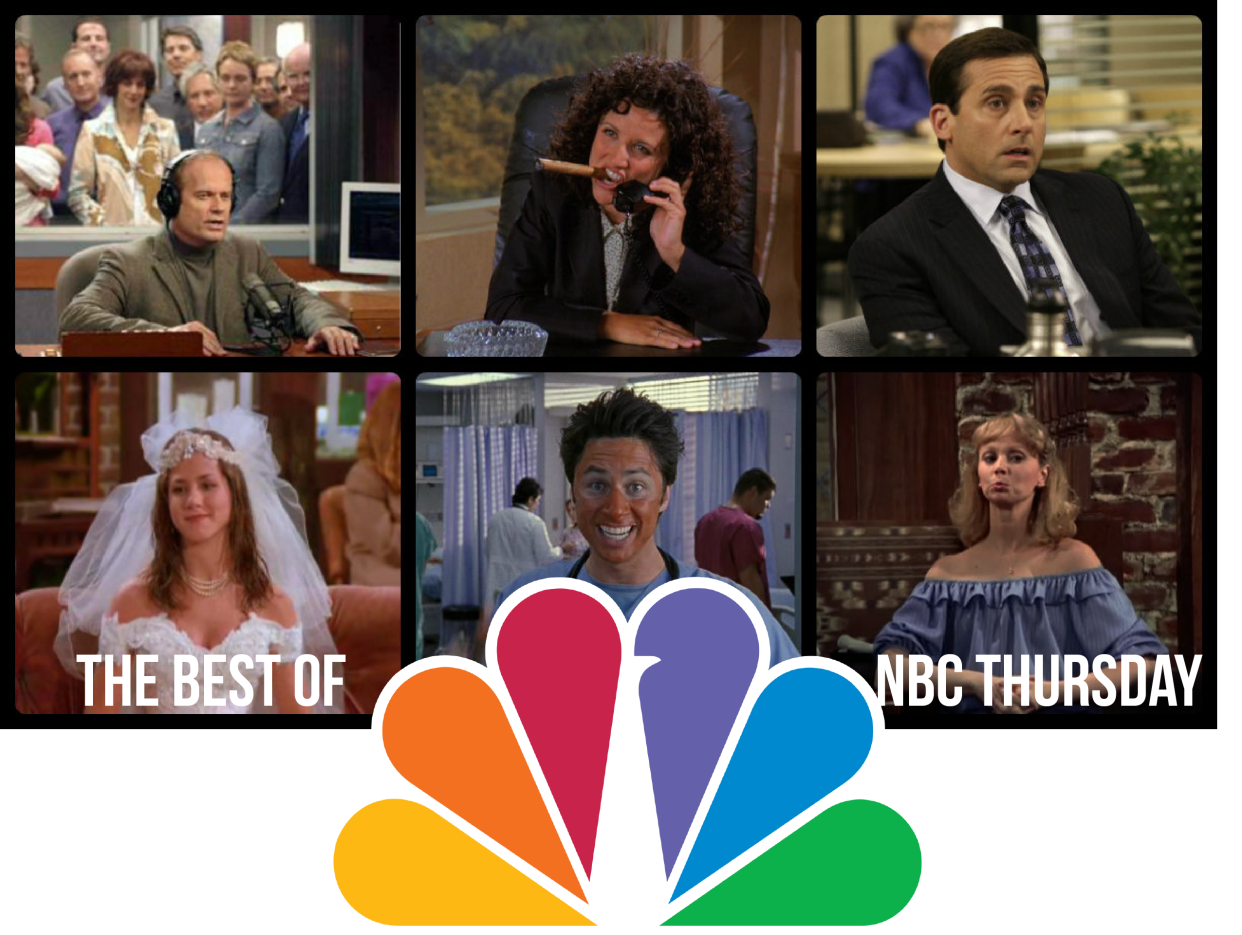
It's the end of an era. NBC has officially ditched its long-running Thursday-night comedy block as it tries to rebuild that part of its schedule with three hours of drama (The Slap, The Blacklist, and Allegiance). Last week, I wrote at length about the historical and cultural importance of the network's Thursday comedies, but today, we just wanted to celebrate some of the great shows that were part of that influential programming strategy.
Despite the fact that you'll see a good number of shows represented here, there are of course many more that aren't mentioned—and that's because NBC Thursdays brought that heat for the better part of three decades. Naturally, that's where you come in. Below, you'll find some of the TV.com staff's fond recollections of their favorites, but we'd love to hear your own picks in the comments.
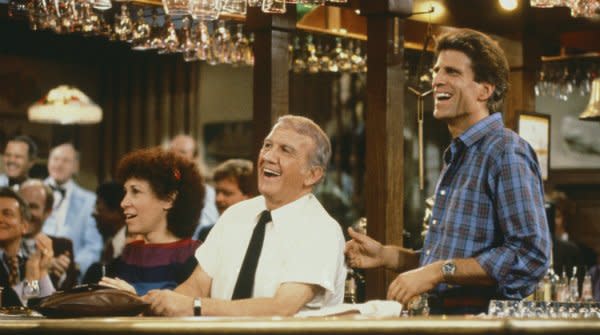
By the end of the series, Cheers was the prototype for Must-See TV shows in the '90s, a formula that could be tweaked to give us all the greats. Cheers is also, almost certainly, the devil's work. How do you keep an all-star cast like that so knitted together? How do you maintain that chemistry? How do you produce an episode where you make Alex Trebek seem like a human being? The answer is black magick, my friends. The next time you're catching up with Sam, Carla, Norm, and Tecumseh, just think about what they had to do for Cheers to achieve its success. I'm sure if you were to look hard enough in the offices of series creators Glen and Les Charles, you'd find an unholy burnt spot stained with the blood of 1,000 virgins. And I'm not talking about the casting couch. —Nick Campbell
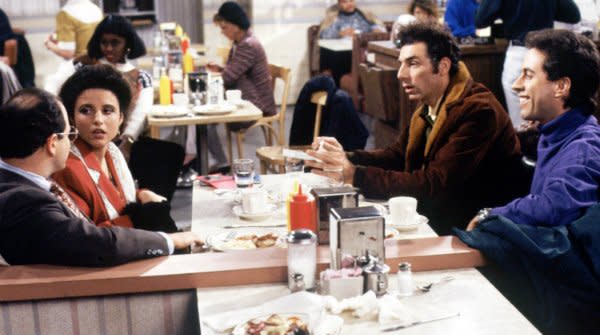
Seinfeld may've billed itself as a show about nothing, but it came to be about everything, from social etiquette—you don't double-dip the chip—to the business of making television. Seinfeld (and Friends) defined NBC's Must-See TV lineup in the 1990s with the well-structured sitcom hijinks of Jerry, Elaine, George and Kramer that always seemed to converge in the best, most insane ways. Where would the world be without Art Vandelay, shrinkage, yadda yadda yadda, being the master of one's domain, Junior Mints, puffy shirts, close-talkers, and soup nazis? I could go on, but what else is there to say except that Seinfeld was real, and it was spectacular. —Noel Kirkpatrick
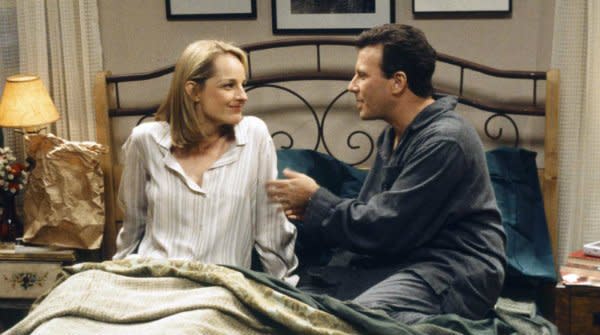
Mad About You may not inspire the same fond memories that Friends does, but it was appointment viewing back in the day! Much like Frasier and NewsRadio, Mad About You was a big deal in my house and to this day it's still the reason I hate the color taupe and have a fear of being locked in the bathroom. Even if you don't remember that Helen Hunt won the Emmy four years in a row for playing Jamie Buchman (she was nominated seven times), perhaps you recall Ursula, the flaky waitress who was eventually revealed to be Phoebe's twin on Friends? And I know you remember Murray, a.k.a. one of the best pets on TV. The series also boasted some incredible guest stars, including Carol Burnett, Mel Brooks, Cyndi Lauper, Yoko Ono, Bruce Willis, Ellen DeGeneres, Billy Joel, AND Macho Man Randy Savage. Mad About You is clearly the product of a simpler time, and a minimal premise like the adventures of newlyweds probably wouldn't survive today, but just the memory of this show (and that Thanksgiving episode where Murray ate the turkey) fills me with happy thoughts. —Kaitlin Thomas
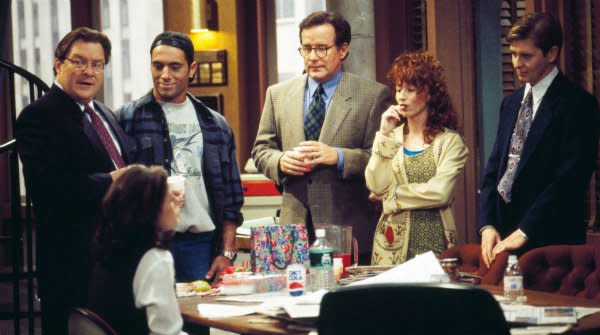
Who cares if it only aired as part of the Thursday comedy block for one month in the summer of 1997? NewsRadio, which ran for five seasons on other days of the week, was the ahead-of-its-time comedy that showed off the wealth of sitcoms NBC once possessed in its heyday. Its cast—which boasted Dave Foley, Phil Hartman, Maura Tierney, Stephen Root, and Andy Dick—was top-notch, but it was the absurd humor and rebellious nature of its producers that separated it from other workplace comedies; that's why it remains a cult hit even today. I mean, they based an entire episode on Jon Lovitz playing a suicide jumper, refused demands for a will-they-or-won't-they storyline between Foley and Tierney's characters, and when NBC forced them to write a funeral storyline for a silly cross-promotion with Four Weddings and a Funeral, they crafted a plot about a rat that died. Good times, good times. —Tim Surette
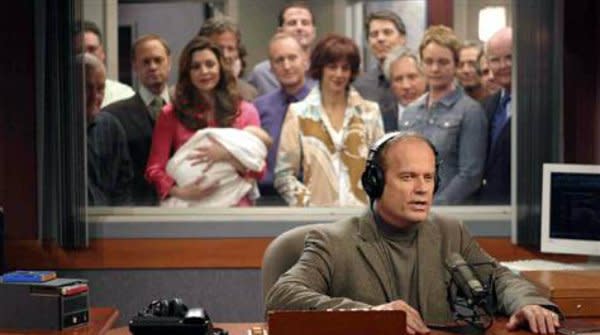
While not a mainstay of Must-See TV, Frasier began its 11-season run in the Thursday comedy block in 1993, and would return to it for two more seasons from 1998 to 2000. Indeed, such was the strength of the Must-See TV brand, that NBC used it to bolster all of its comedy blocks, including Tuesdays, the night Frasier aired on after its first season, and typically called home. Of course, not being a regular resident of the Thursday lineup didn't hold the show back—especially at the Emmys, where it dominated for many years. —Noel
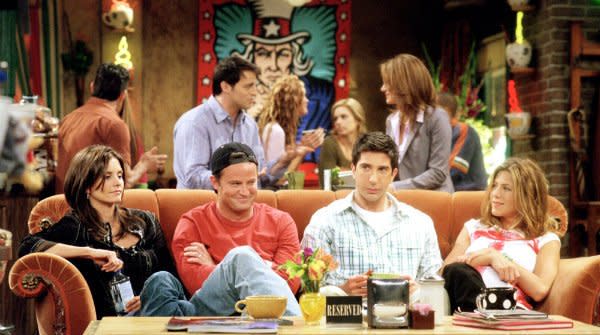
You couldn't get away from Friends in the '90s. There were coffee table books, video guides for Windows 95, so many people asking their hairstylists for "the Rachel" (sadly, most of them lacked Jennifer Aniston's refined bone structure). And syndication only made the show more ubiquitous. At its core, it was a simple series about six anxiety-prone people with great chemistry. It also fell into the trap of every sitcom trope available and was famously unrepresentative of a diverse population. However, it was so amazingly watchable and so current, with just enough edge in its broadness to keep things interesting; if Seinfeld wholly rejected the flow of a traditional comedy, Friends embraced it and, with its pretty cast and fearless story arcs, became a juggernaut. Looking back in hindsight, it's easy to identify its flaws, but can I remember the name of Ross and Monica's dead grandmother (Althea) and the name of the model Chandler gets trapped with in an ATM vestibule (Jill Goodacre) off the top of my head? What about how many different types of towels Monica keeps in her bathroom (11), or Ross's secret bedroom fantasy (Leia in the gold bikini)? Of course. Because you can't get away from this show without trying really hard. And I (happily) gave in a long time ago. —Nick
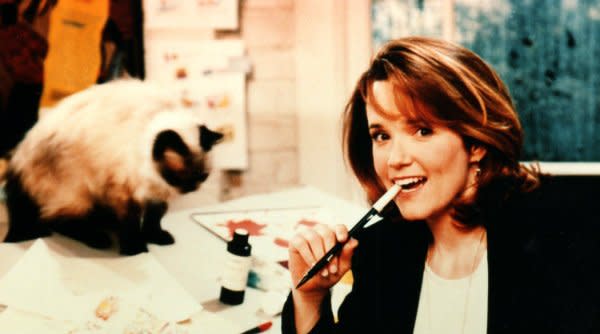
I can't tell you what initially drew me to Caroline in the City (heck, these days, I can barely remember what most of the episodes were about), but I suspect it had something to do with the Wisconsin-born title character's success in New York. As a teenager watching from Ohio and thinking about my own plans for a New York-centric future, I was infatuated with Friends and Caroline and their glamorous, totally unattainable NYC apartments. Plus, I couldn't help but fall for the plucky, needy cartoonist, her curmudgeonly colorist Richard, and their (eventual) star-crossed romance. While Caroline wasn't the most brilliant or groundbreaking series to ever hit the airwaves, it was consistently sharp, funny, and charming, and the ensemble cast was solid. Malcolm Gets, who played Richard, hasn't done much acting since Caroline ended in 1999, but man, I'd love to see him on TV again. —Jen Trolio
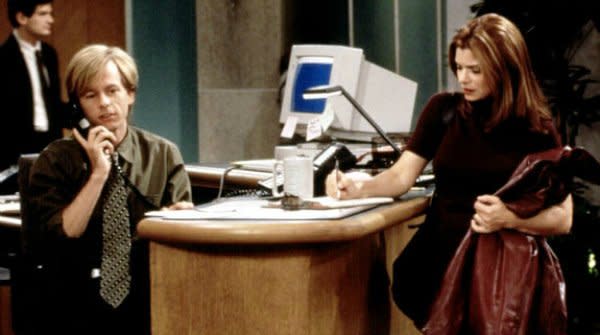
Come for David Spade, stay for everyone else. Just Shoot Me chronicled the hijinks of a hapless editorial crew for Fake Cosmo—sorry, Blush—and featured the traditional cast of smarmy hornballs, alcoholic editors, and egotistical publishers. Everyone was a jerk, but let's face it, jerks are entertaining. Also: David Spade. While the series fumbled in various timeslots later in its life, it dominated in the early going with great episodes like "Back Issues," "Secretary's Day," and "Lemon Wacky Hello." —MaryAnn Sleasman
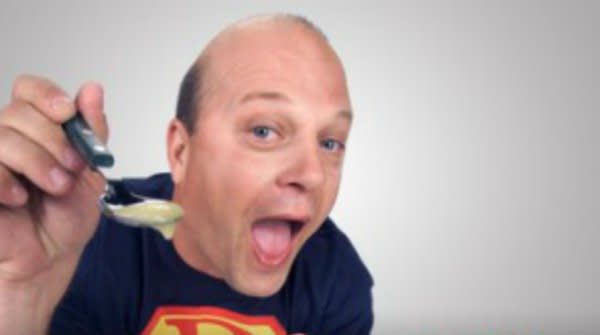
The year was 2000, the actor was a working-class thesp from Massachusetts fresh off a 94-episode hot streak in a little number called The Commish. Today we know him as Michael Chiklis, but at the turn of the millennium, fans of laughter and Thursday nights knew him as "Chris Woods," the titular patriarch of Daddio. The premise was as elegant as it was simple: A former restaurant supply salesman (Chris "Daddio" Woods) decided to become a stay-at-home dad to four children as his lawyer wife (Anita Barone) took the legal world by storm. To say the formula was as airtight as an astronaut's space-bedroom would be an understatement; in what could be seen as a hubris-filled victory lap, the Daddio-verse also boasted meddlesome married friends, a skeptical single friend, AND a neighbor who was a Marine. No wonder this gut-buster garnered such recognition as the coveted BMI TV Music Award AND a Teen Choice nomination! Things were looking Daddiolicious, and Chiklis was unstoppable. But then something shocking happened. Even though Daddio blazed into a 13-episode second season, only four of those episodes ever aired, while would-be classics like "A Confederacy of Daddies," "Of Mice and Math," and "To Kill a Rocking Band" were lost to the annals of time. Will they ever see the light of day? Probably not. Probably not. —Ryan Sandoval
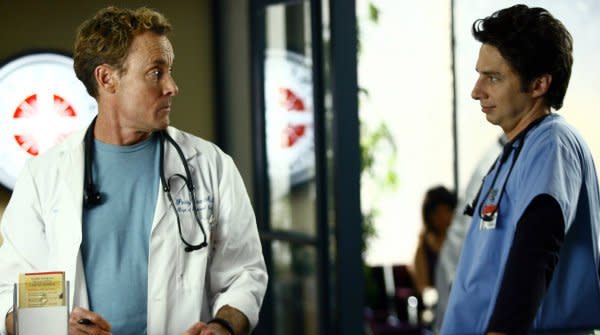
Scrubs is not overrated. Scrubs was never overrated, you shut your mouth, haters. I don't even know if Scrubs-haters are a thing, but the handful of people in my life who claim to dislike the show are, well, I just don't get them. Dr. Cox is still my personal hero and I have yet to find another sitcom that can so seamlessly combine the absurd and the quirky with the deep and insightful, all to the tune of a pretty decent early 2000s soundtrack. Go ahead, go re-watch Season 1's "My Old Lady." DO IT. —MaryAnn
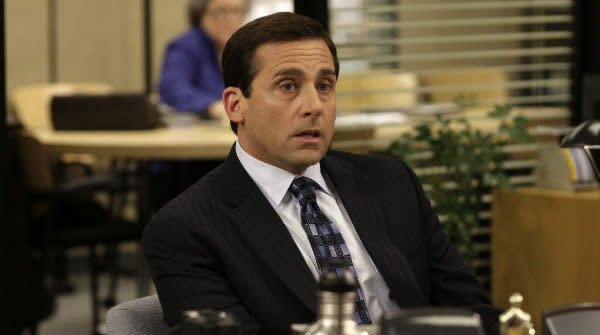
The Office is a story of What Ifs. What if Kevin Reilly, NBC boss at the time of the show's launch, didn't believe in adapting the popular U.K. series for U.S. audiences? What if Steve Carell hadn't starred in The 40 Year-Old Virgin the summer between Seasons 1 and 2? And what if the TV industry hadn't embraced the practice of selling episodes of young-skewing shows on iTunes early in The Office's run? But how about this: What if The Office had failed? What would've happened to NBC's Thursday comedy block then? Maybe NBC wouldn't have had the patience for 30 Rock a year later, maybe it would've lost interest in a contemporary type of self-aware, savvy comedy, and maybe Parks and Recreation and Community would've never been born at all. Sure,The Office ran two seasons too long and lost steam two years before that, but it's the seminal American sitcom of the 21st century and NBC prolonged its stay at the top of comedy—in the face of increasing competition from cable and the internet—because those What Ifs never came to be. —Cory Barker
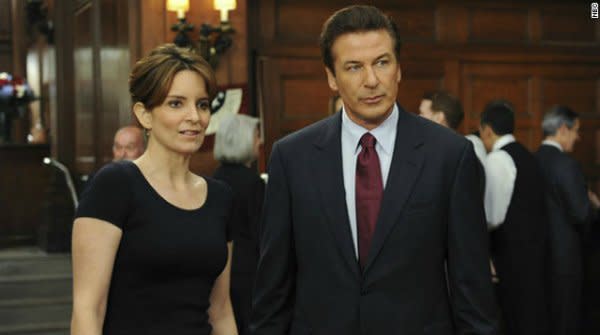
NBC's dwindling fortunes on Thursday nights—30 Rock helped to usher in the night's rebranding as "Comedy Night Done Right" in 2006—were probably the best thing that ever could've happened to 30 Rock. Not only because the show had a lower bar to clear in terms of ratings demands, but because it got so much mileage out of mocking its own network's failures that I couldn't help but appreciate the fact that the suits in charge of the then-sinking NBC had a sense of humor about their inability to dig themselves out of the broadcast TV basement. 30 Rock was a zany show about television, and it loved TV the same way I did: with love and irreverence, with respect, and with an arched, knowing eyebrow. I don't say this about many now finished shows, but I miss 30 Rock every single day. —Noel
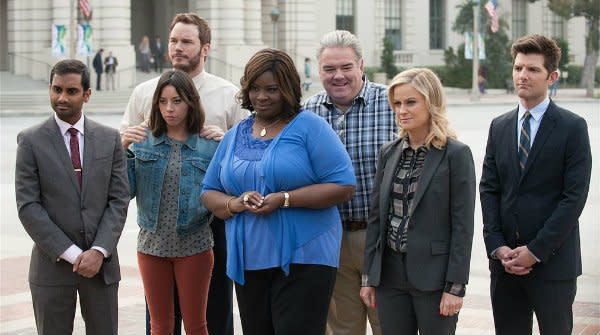
Much like the pit that started it all, Parks and Rec looked a little rough in the beginning, but thanks to a lot of hard work from the show's talented cast and writers, it's become something beautiful that we can all enjoy. I've come to think of the show as the Friday Night Lights of comedies because it's just as likely to make me cry tears of sadness as it is to make me cry tears of happiness. The show perfectly blends sentimental, heartfelt stories with hysterical busting comedy in a way that I've never really seen done before. It's also one of those shows that gets better as it ages; characters like Andy, April, and Tom have grown up and become integral members of the Pawnee ecosystem, and I care about them as much as I care about the relationships between Leslie and Ron or Leslie and Ben. Parks and Rec punches you right in the heart before kicking you in the crotch for laughs, and if I could find a way to keep it on TV forever, I would. I love you and I like you, show. —Kaitlin
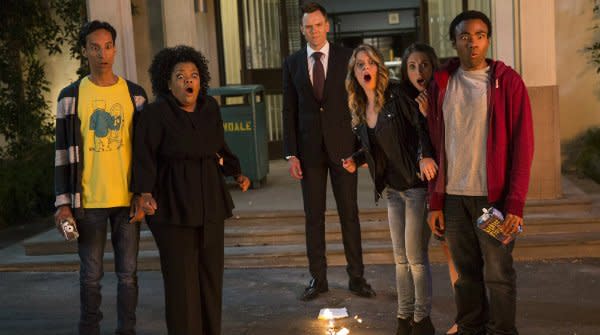
Let's face it, Community never belonged on network television at all. It's too good to air alongside below-average fare like The Paul Reiser Show (which it did in 2011) or even just your average joke-by-numbers sitcom. But the Dan Harmon comedy somehow landed a spot in NBC's famed comedy block... and then predictably tanked with the mainstream. Thankfully, the internet loved the show's endless creativity and rule-breaking, forcing NBC to keep it around for five four three amazing seasons. When Community was firing on all cylinders, there was nothing else like it on television. Paintball, fake clip shows, alternate timelines—you name it, Community made it work. But for all of its absurdity, Community's greatest feat was to build a strong emotional core, which it brought to life with the seven amazing characters who sat at the study table in each episode. —Tim
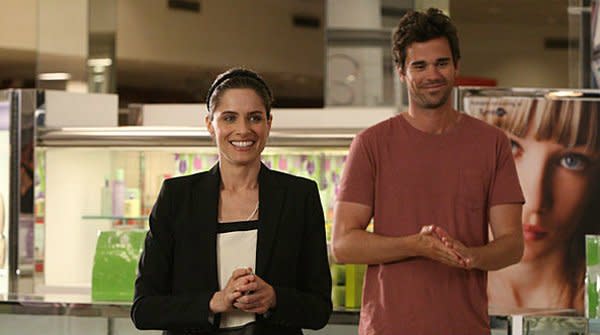
I know, I know. Combined, Perfect Couples and Bent aired 17 episodes, an infinitesimal number compared to every other show on this list (well, except for Daddio). But both late-era shows deserve a little love because they debuted under terrible circumstances (and because they were NBC's first two attempts at Making David Walton Happen; thanks About a Boy). Neither show jived with the "smart" quartet of The Office, Parks and Rec, 30 Rock, and Community, but they also had no business in the network's burgeoning "broader is better" initiative. Perfect Couples took some time to get going in early 2011, but evolved into a consistently funny show by the end of its Season 1 episode order, as many sitcoms do. And Bent was a six-episode burn-off seemingly from jump street, despite the fact that it had a whole lot of heart and boasted great performances from Amanda Peet and Jeffrey Tambor, who are both headlining other shows now. Ultimately, Perfect Couples and Bent proved that even the best network TV lineups include missed opportunities and mistakes, even when the shows themselves are pretty great. —Cory
Which of NBC Thursday comedies do you remember most fondly?


